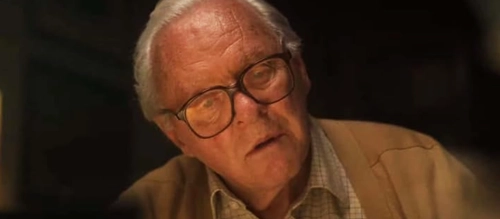
One Life (2023)
Director: James Hawes
Screenwriters: Lucinda Coxon, Nick Drake
Starring: Anthony Hopkins, Helena Bonham Carter, Johnny Flynn, Ramola Garai, Jonathan Pryce, Lena Olin
Perhaps there is something in the air that says that, for the last few years, we as a human race haven’t had the best run of things, and we therefore need something to bring back a sense of human decency, to remind us of what we’re capable of as a species. There is also, perhaps, a feeling that we need to make use of one of the best actors working in the English language, Sir Anthony Hopkins, whilst we still have him. All this must have crossed the minds of the executives at BBC Film, who have finally put to screen the story of Nicholas Winton, a stockbroker who earned the name ‘The British Schindler’ after he organised an effort to evacuate 669 children from Czechoslovakia to Britain at the outbreak of the Second World War.
There is perhaps nobody more suited to play the older Winton than Anthony Hopkins. The frail humanity he portrayed in his Oscar-winning turn in The Father showed he had exactly the right abilities for Winton, innocent and unassuming yet tough in his own way. The turn from Johnny Flynn (who manages to look remarkably like the actual young Winton) matches up incredibly well with Hopkins, the pair nearly fifty years apart yet embodying exactly the same low-key, un-confrontational, yet determined soul.
Being made by BBC Film and employing Jason Hawes as the director (who has worked almost his entire career in television and TV movies), the film knows exactly what it is, and there are times when it does feel like a bigger-budget TV film. Not that this takes away from anything, because Hawes knows where to place the camera to get the biggest reaction from this tearjerker that he can. And he knows what the film is; it’s a sensitive topic but not a particularly harrowing film save for one or two scenes which, by their subject matter of Nazi occupation, have to be. It’s there to create the pathos leading up to one final scene. There are bigger scale events, but the film is more concerned with the intimate moments rather than great sweeping cinematics, which works to the film’s favour.

Everything building up to this final scene works fairly well, with the editing mostly fine – one scene involving Helena Bonham Carter as young Winton’s mother, and Winton himself, creating cards to send in envelopes through the post to try and rally support and potential foster homes, being nicely paced with snappy editing – but it’s not altogether perfect; a few conversations between Winton and other characters near the latter third of the film are sloppily constructed with quick two-camera coverage.
The film is unbearably optimistic towards Winton, showing in no moment any kind of doubt from him, nor moment of weakness, and although no one can deny his incredible humanitarian achievements, just a little flash of something different might have shown his humanity, instead of portraying him as a kind of superhuman pillar of moral virtue. We all have our flaws, and showing one or two of them, even in a tiny crack, is what makes us true people. Then again, when the film had Barbara Winton as one of the producers (who reportedly only greenlit the film on the demand that Hopkins play her father), that is not at all surprising. Additionally, although Winton in the film does touch upon the fact that other people were involved with the organisation of the trains and rescue effort, the film undoubtedly casts most of the light and credit onto Winton. Modern historians are keen to point out that although Winton was the face, others took just as many (if not more) risks, and we should not forget them. The film tries not to forget them, but in a ‘congratulations on your silver medals, now here’s the real star of the show’ kind of way.
These factors don’t detract too much, thankfully, and when everything is designed for the ‘This Life’ segments near the end of the film, there isn’t much you can do to stop a lump in your throat from forming. The film is a biopic, it’s a historical light on the humanitarian efforts of a team led by a man who shunned the spotlight and kept pretty much everything hidden and secret for decades after. With this, it’s a very hopeful and inoffensive telling of the story, and although perhaps it does its best to imagine the absolute best of every single person imaginable and doesn’t hit absolutely every mark it should, when it does hit those correct notes, by God does it strikes a powerful chord.
Score: 18/24

